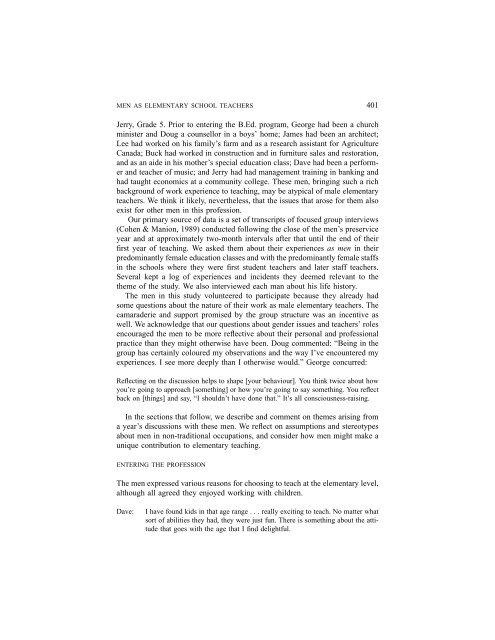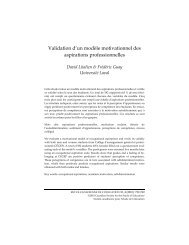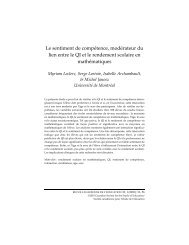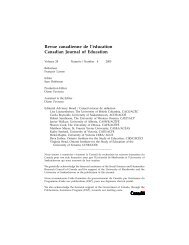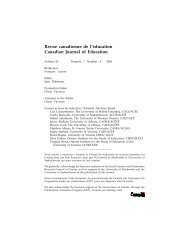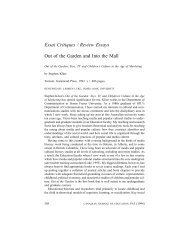Mireille Falardeau et Michel Loranger Le choix de stratégies ... - CSSE
Mireille Falardeau et Michel Loranger Le choix de stratégies ... - CSSE
Mireille Falardeau et Michel Loranger Le choix de stratégies ... - CSSE
You also want an ePaper? Increase the reach of your titles
YUMPU automatically turns print PDFs into web optimized ePapers that Google loves.
MEN AS ELEMENTARY SCHOOL TEACHERS 401<br />
Jerry, Gra<strong>de</strong> 5. Prior to entering the B.Ed. program, George had been a church<br />
minister and Doug a counsellor in a boys’ home; James had been an architect;<br />
<strong>Le</strong>e had worked on his family’s farm and as a research assistant for Agriculture<br />
Canada; Buck had worked in construction and in furniture sales and restoration,<br />
and as an ai<strong>de</strong> in his mother’s special education class; Dave had been a performer<br />
and teacher of music; and Jerry had had management training in banking and<br />
had taught economics at a community college. These men, bringing such a rich<br />
background of work experience to teaching, may be atypical of male elementary<br />
teachers. We think it likely, nevertheless, that the issues that arose for them also<br />
exist for other men in this profession.<br />
Our primary source of data is a s<strong>et</strong> of transcripts of focused group interviews<br />
(Cohen & Manion, 1989) conducted following the close of the men’s preservice<br />
year and at approximately two-month intervals after that until the end of their<br />
first year of teaching. We asked them about their experiences as men in their<br />
predominantly female education classes and with the predominantly female staffs<br />
in the schools where they were first stu<strong>de</strong>nt teachers and later staff teachers.<br />
Several kept a log of experiences and inci<strong>de</strong>nts they <strong>de</strong>emed relevant to the<br />
theme of the study. We also interviewed each man about his life history.<br />
The men in this study volunteered to participate because they already had<br />
some questions about the nature of their work as male elementary teachers. The<br />
camara<strong>de</strong>rie and support promised by the group structure was an incentive as<br />
well. We acknowledge that our questions about gen<strong>de</strong>r issues and teachers’ roles<br />
encouraged the men to be more reflective about their personal and professional<br />
practice than they might otherwise have been. Doug commented: “Being in the<br />
group has certainly coloured my observations and the way I’ve encountered my<br />
experiences. I see more <strong>de</strong>eply than I otherwise would.” George concurred:<br />
Reflecting on the discussion helps to shape [your behaviour]. You think twice about how<br />
you’re going to approach [som<strong>et</strong>hing] or how you’re going to say som<strong>et</strong>hing. You reflect<br />
back on [things] and say, “I shouldn’t have done that.” It’s all consciousness-raising.<br />
In the sections that follow, we <strong>de</strong>scribe and comment on themes arising from<br />
a year’s discussions with these men. We reflect on assumptions and stereotypes<br />
about men in non-traditional occupations, and consi<strong>de</strong>r how men might make a<br />
unique contribution to elementary teaching.<br />
ENTERING THE PROFESSION<br />
The men expressed various reasons for choosing to teach at the elementary level,<br />
although all agreed they enjoyed working with children.<br />
Dave: I have found kids in that age range . . . really exciting to teach. No matter what<br />
sort of abilities they had, they were just fun. There is som<strong>et</strong>hing about the attitu<strong>de</strong><br />
that goes with the age that I find <strong>de</strong>lightful.


